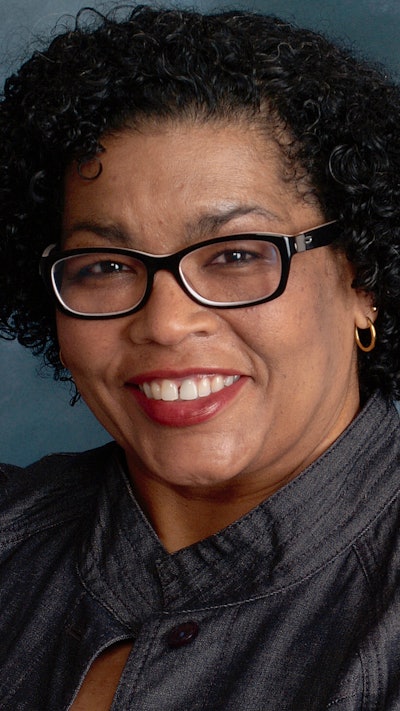The career goals and objectives of business students have evolved greatly over the past decade. While there are many undergraduates and graduate students aiming for careers in banking or finance, there are also entrepreneurs, innovators, people interested in hospital administration, and others seeking positions at nonprofit organizations.
We take a look at institutions that have excelled at graduating a diverse student base.
University of Maryland Global Campus
 Dr. Pam Carter
Dr. Pam Carter
UMGC was recently designated a Minority Serving Institution. In its undergraduate programs, African American students comprise 31%, Hispanic/Latinx are 15%, two or more races 4%, and Asian 5%. At the graduate level, African American students are 39%, Hispanic/Latinx 9%, two or more races 4%, and Asian 6.5%. The current overall completion rate for undergraduates is 27%, and 56% for graduate students.
Carter notes that most UMGC students have adult obligations. “We have a very high underrepresented minority presence in our student body, but it’s not because we have special recruitment for that. It’s because we have special recruitment for folks who want an alternative to the traditional experience. Because we focus on that demographic, we have built that in as part of our mission,” says Carter.
UMGC is open access, which means there are students from different backgrounds and preparation levels. In terms of retention, Carter says hiring supportive faculty is a huge component. “We also have a lot of supports built into our curriculum,” she says. “Recognizing that we need to try as best we can to meet students where they are and get them to where they want to go with the credential they’re working toward.”
After degree completion, undergraduates get positions such as account analysts, managers, contract specialists, and business analysts. Two recent MBA graduates became presidential management fellows, three-year positions with the federal government. Other graduate students have received promotions to senior level managers. Both bachelor’s and master’s graduates are starting their own businesses.
“Because of the range of programs we have, there are many career paths,” Carter says.
Webster University
The mission of Webster University, a private institution in Missouri, prioritizes diversity, equity, and inclusion (DEI). The George Herbert Walker School of Business & Technology offers both undergraduate and graduate programs with in-person and online options. Webster’s main campus is in Webster Groves and there are two satellite campuses in St. Louis. There are also military and metro sites throughout the U.S.
There are eight undergraduate degree programs that offer a variety of emphasis areas and 17 master’s degree programs with emphasis areas. For example, the MBA programs offer 11 emphasis areas, including cybersecurity, health administration, data analytics and human resources. The most popular graduate programs are the MBA and the M.A. in management and leadership.
Webster’s business school provides an academic resource center. “Students can go for tutoring, writing support and other things at no charge. Even more than that, we have small classroom sizes (no more than 24 chairs),” says Dr. Simone Cummings, dean of the Walker School. Students are also tracked through Starfish and resources made available when needed.
Graduate students tend to gravitate towards online, but even within online there are various modalities in which courses are offered. “We get students of color primarily through word-of-mouth and because of the fact that we have so many faculty members who are people of color,” Cummings says.
Webster Women in Business meets on a monthly basis, mostly online so that people in disparate locations can attend. “It gives students a chance to network with each other,” Cummings says. “We also bring in alumnae and sometimes guest speakers.”
Seven students have recently been hired to be the first cohort of the Edward Jones Career Pathways partnership, a joint initiative between Webster and the financial services company. The business school also received a Missouri Career Attainment Network grant to provide minority students comprehensive information about career pathways.
In the fall of 2022, Webster hosted a diversity career fair for which corporations were asked to provide a statement about how DEI shows up in their organizational mission. “We were very clear that we wanted them to come, meet and hire our students of color,” says Webster’s Chief Diversity Officer and Associate Vice President of DEI Vincent C. Flewellen.
Florida International University
 William Hardin
William Hardin
“We offer all modalities: online, in-person, hybrid and we have synchronous and asynchronous online modalities,” says Hardin. “We have been doing online in some fashion for at least 25 years, so we have a lot of familiarity with various modalities.”
FIU is one of the largest Minority Serving and Hispanic Serving Institutions in the country. “We have everything from first-year programs of engagement to continuous availability of advisors to strategic goals of retaining and maintaining our enrollment to allow students to graduate on a timely basis,” Hardin says.
Hardin notes, “We graduate at the master’s level more students than any other institution in the Florida state university system.” There is a considerable portfolio of graduate business programs, including logistics and supply chain, real estate, marketing and accounting. There are many students from South Florida, but there is also global interest in the master’s degree programs. Hardin estimates that 80% of current graduate students are employed while pursuing their education. Recruitment is done through professional organizations and media.
“Most of our programs are cohort based,” says Hardin. “We find that cohort-based programs create group dynamics that benefit completion.”
Large accounting firms and banks recruit FIU graduates, Hardin says. This includes Ernst & Young, Deloitte, JP Morgan and Bank of America. Hardin also notes that Miami is an entrepreneurial city, so many students are attracted to start-ups and starting their own businesses. “We place people anywhere from UBS (financial services) to someone who decided to take a risk and start a business through our Center for Entrepreneurship where they were mentored,” he says.
University of Illinois at Urbana Champaign
The Gies College of Business at University of Illinois at Urbana Champaign serves undergraduate and graduate students, both residential and online. The undergraduate business major is mainly residential, although some classes have an online option, and the business minor is fully online. In the graduate space, there are portfolios of residential programs and online programs, which are not blended and serve very different populations.
“In the online [graduate] space, we serve working professionals,” says Dr. W. Brooke Elliott, executive associate dean and EY Professor. There are three online degree programs: MBA, master of science in management and master of science in accounting. There are currently about 4,500 students with an average age of 36.
“When we launched IMBA (online) in 2016, we disrupted business education in that we offer an MBA for under $24,000,” says Elliott. “We committed to offering both synchronous and asynchronous components. In all of our online programs, there are weekly live sessions. Our same faculty members that teach in the residential programs teach in the online programs, and they run the live synchronous sessions just as if they’re running a course with residential students, albeit with different technology, so we can ensure that it’s an engaging experience.”
In the undergraduate business minor, 15.2% of the students are underrepresented minorities. The current undergraduate student cohort of business majors is 19.5% underrepresented minorities. Online, 18.1% of the graduate students are underrepresented minorities across the three graduate degree programs. Elliott says the retention rate for online is over 96%, which she attributes to the stellar faculty and flexibility. Outreach for undergraduate students is largely focused within the state of Illinois.
The College of Business is named for Larry Gies, founder and CEO of Madison Industries. In 2018, Larry and Beth Gies gave $150 million. Since then, the number of scholarships has significantly increased, which has brought increased diversity.
“In the graduate space, we do a lot of focused webinars and coffee chats that are marketed,” Elliott says. “We’ll focus on first-gen students, military and veterans, women, international students and different populations of underrepresented students. … We create an environment that supports them.”
“That has been very successful in attracting more underrepresented minority students, and interestingly, women into our program,” Elliott says. “If you can demonstrate you can be successful in graduate business education, then we would like to serve you irrespective of what your undergraduate GPA might have been years ago. We serve working professionals.”





















